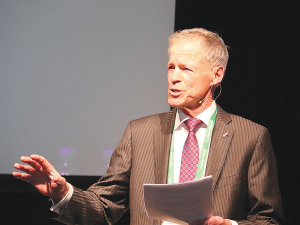NZ Catchment Groups Thrive with ‘Source to Sea’ Approach
The most successful catchment groups in NZ are those that have 'a source to sea' approach.
 Lockwood Smith believes NZ is missing out on producing climate change solutions because of our ban on gene editing.
Lockwood Smith believes NZ is missing out on producing climate change solutions because of our ban on gene editing.
A plea for New Zealand to embrace gene editing is being sounded by Sir Lockwood Smith.
Smith is a former NZ High Commissioner to London, Speaker of Parliament, trade minister and Massey University scientist.
He told the recent Federated Farmers annual conference that NZ, by holding out on gene editing, is missing an opportunity to deal with climate change and carbon emissions, and to improve pasture species.
Smith says gene editing is a safe process that simply involves slightly altering the best genes in a particular species of animal or plant.
Embracing gene editing is critically important to enable NZ to progress in key primary sector areas, Smith told the conference.
Opposition to gene editing “is based on ignorance, and I don’t mean that in an unkind way, I just mean there’s a lack of understanding.
“People are more fearful of wider genetic modification. This involves taking genes from one species and using them in another one… notably the toad/gene thing, which is the other end of gene technology and a track we don’t need to go down right now.”
Start gene editing now, Smith urged the conference. This is needed now because new pasture species are being researched and gene editing would make them much more efficient.
But it would need doing in the US as it’s banned in NZ. “Our primary industries are suffering financially as a result of this.”
Scientists in NZ must speak up, says Smith. And news media should not just cover people with colourful, flamboyant views, but also talk to respected scientists.
Asked about Smith’s views on gene editing, Agriculture Minister Damien O’Connor urged caution. He says big marketers of NZ meat and dairy told him recently in London that they don’t want products in any way genetically modified.
These companies say NZ has a market advantage in not having GMOs in food. But O’Connor doesn’t rule it out completely for the future, he said.
“Clearly gene editing is incredibly valuable… but we must ask, who are the consumers of our products and what are they looking for? Being non-GMO gives NZ an advantage now but will it in future and what are the trade offs?”
O’Connor says he’s not dismissing the technology but it needs a lot more work and discussion for a final decision.
Agrisea NZ has appointed Craig Hudson as it's new chief growth officer.
State farmer Landcorp, trading as Pamu, is a forecasting a full-year net profit of around $100 million.
Tony Aitken, chief executive of Ruralco, has been awarded the Excellence in Business Leadership Award at the ANZ Business of the Year Awards.
Global trade has been thrown into another bout of uncertainty following the overnight ruling by US Supreme Court, striking down President Donald Trump's decision to impose additional tariffs on trading partners.
Controls on the movement of fruit and vegetables in the Auckland suburb of Mt Roskill have been lifted.
Fonterra farmer shareholders and unit holders are in line for another payment in April.

OPINION: Here w go: the election date is set for November 7 and the politicians are out of the gate…
OPINION: ECan data was released a few days ago showing Canterbury farmers have made “giant strides on environmental performance”.